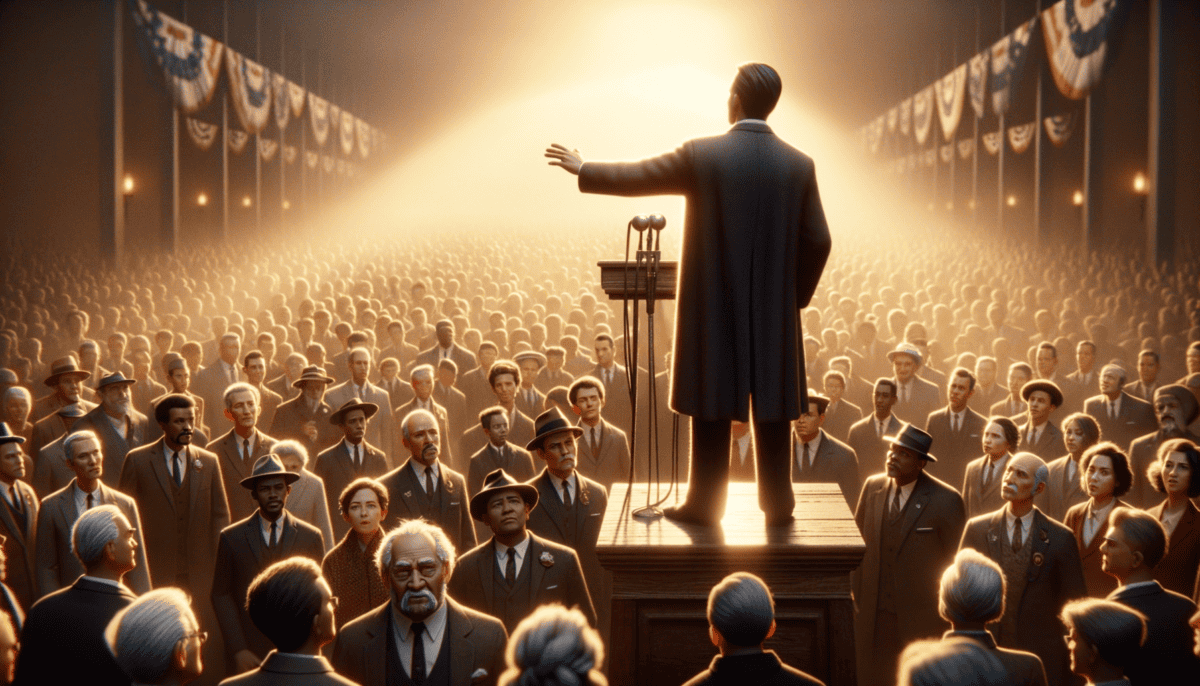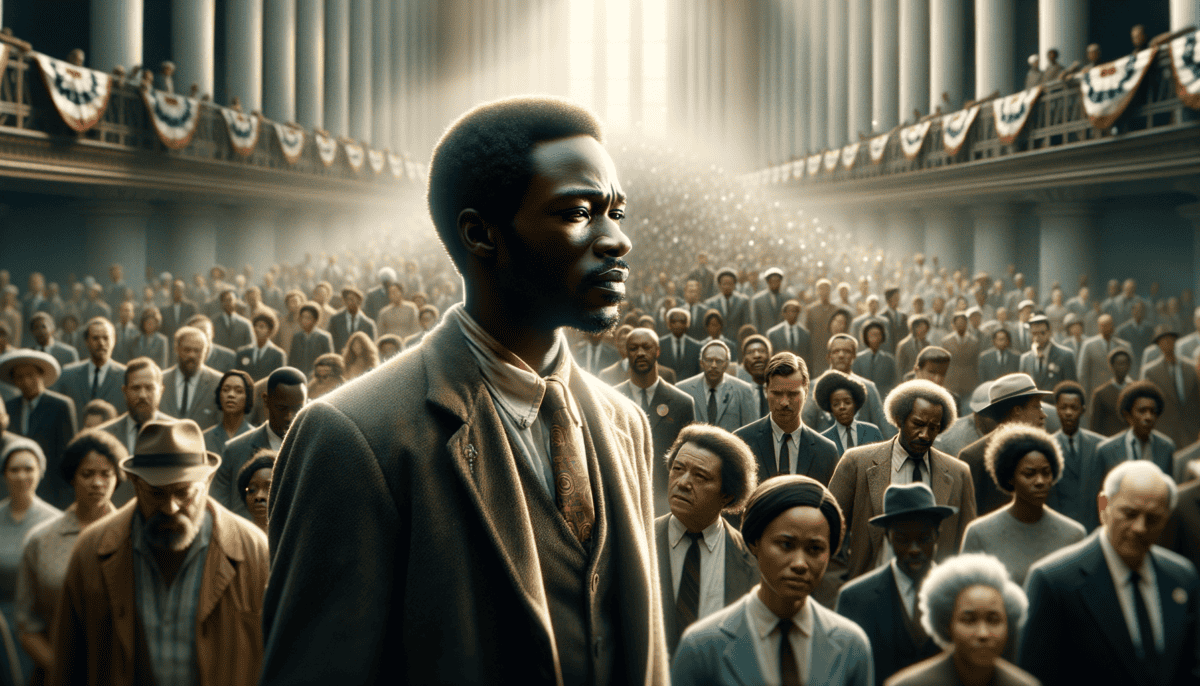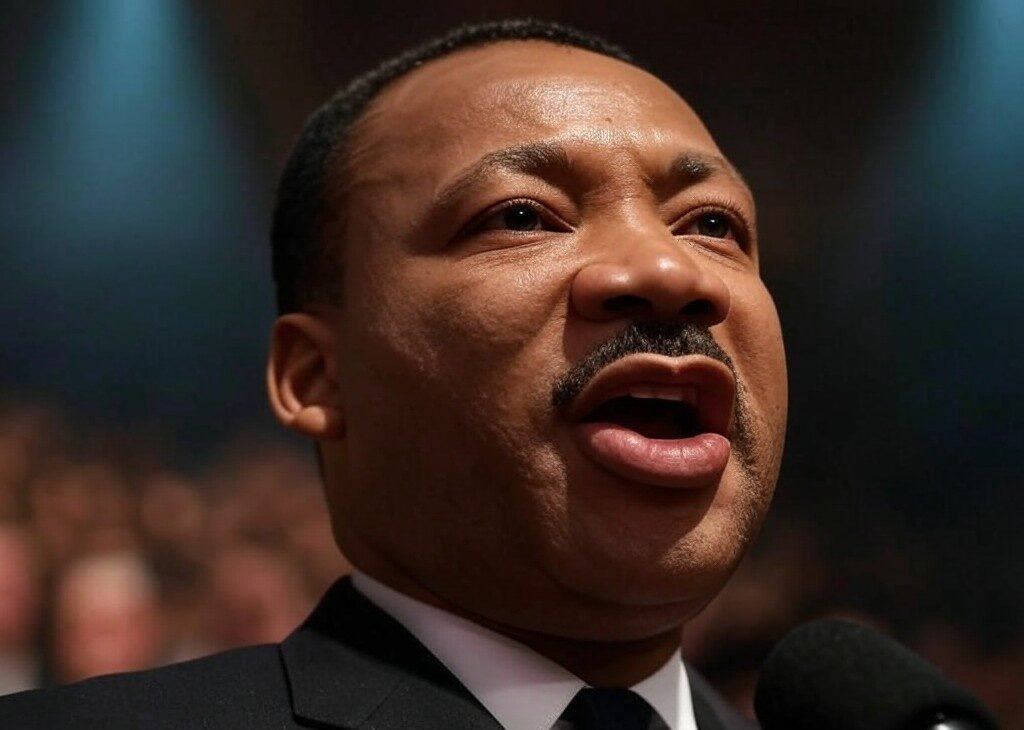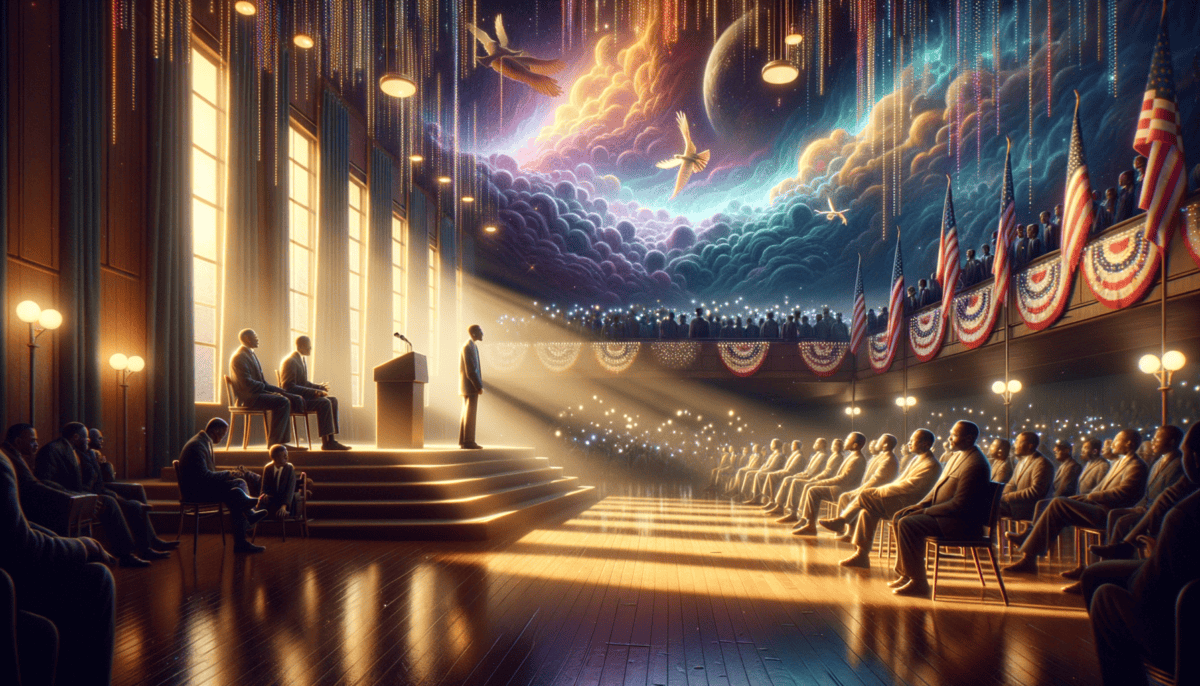Roots of Courage
On a warm morning in 1929, a special baby boy was born in Atlanta, Georgia. His name was Martin Luther King Jr. His family called him “M.L.” for short. Little did anyone know that this baby would grow up to change the world!
Martin lived in a big yellow house with his mother, father, sister, and brother. His father was a preacher at the Ebenezer Baptist Church, and his mother was a teacher. They taught him to be brave and to treat everyone with kindness. ❤️
“Remember M.L.,” his mother would say, “you are somebody special. God loves all His children the same.”
But young Martin soon learned that not everyone believed this. One day, when he was just six years old, something happened that made him very sad.
Martin’s best friend was a white boy who lived nearby. They played together every day until the boy’s father said they couldn’t be friends anymore – just because Martin’s skin was a different color.
“Why, Mama?” Martin asked with tears in his eyes. “Why can’t we be friends anymore?”
His mother hugged him close and explained, “Some people have wrong ideas about others because of their skin color. But that doesn’t make it right.”
In those days, there were unfair rules called “Jim Crow laws.” These rules meant:
• Black people couldn’t drink from the same water fountains as white people
• They had to sit in different parts of buses and restaurants
• They couldn’t go to the same schools or parks
Young Martin noticed these things everywhere he went. He saw the “WHITE ONLY” and “COLORED” signs on doors and fountains. But his parents taught him something very important:
“You are as good as anyone,” his father would say from the pulpit. “God made all of us equal.”
Martin loved going to church with his family. The beautiful songs and powerful words made him feel strong. He watched his father preach with such passion that it made people stand up and cheer. This taught Martin that words could move people’s hearts.
As Martin grew older, he became an excellent student. His teachers said he was very smart and had a wonderful way with words. He skipped two grades in school because he learned so quickly!
But what made Martin special wasn’t just his smarts – it was his heart. Even when others were mean, he remembered what his parents taught him about love and dignity. He dreamed of a day when all children could be friends, no matter what they looked like.
One evening, after seeing more unfair treatment, young Martin told his mother: “When I grow up, I’m going to help make things right.”
His mother smiled and said, “You can do anything you set your mind to, M.L. Just remember to use love, not hate.”
These early lessons would shape Martin’s whole life. The little boy who felt the sting of unfairness would grow up to lead millions of people toward justice – but always with love in his heart.
Those childhood days in Atlanta planted seeds of courage that would one day bloom into something amazing. Martin was learning that standing up for what’s right isn’t always easy, but it’s always worth it.

The Calling of Justice
Young Martin grew into a thoughtful teenager who loved to learn. In 1944, at just fifteen years old, he started college at Morehouse College in Atlanta! Most students were much older, but Martin’s bright mind had helped him skip two grades in school.
One day, during his first year at college, Martin heard something that would change his life forever. His teacher was talking about a man named Mahatma Gandhi from far away in India.
Martin sat up straighter in his chair, his eyes wide with interest. This was different from anything he’d heard before!
“But how can you fight without fighting?” Martin asked.
His professor smiled and said, “By using your mind and heart instead of your fists. By standing strong without hurting others.”
Martin learned that peaceful protest could be stronger than violence. This idea would become very important in his life.
At college, Martin also met wonderful teachers who helped shape his thinking:
• Dr. Benjamin Mays – taught him about standing up for justice
• Dr. George Kelsey – showed him how faith can change the world
• Dr. Walter Chivers – helped him understand society better
One Sunday morning, while Martin was visiting a church, he heard a powerful sermon about making the world better. Right then, he felt something special in his heart – like a quiet voice telling him what to do.
“I want to be a minister like my father,” he told his family. “I want to help people and fight for what’s right.”
His father beamed with pride. “Son, that’s a wonderful choice.”
Martin practiced speaking in front of mirrors and small groups. He learned to use his voice in a way that made people listen. Soon, others noticed his special gift for speaking.
In his final year of college, Martin gave a speech that won first prize in a big contest. The topic? “The Negro and the Constitution.” His words were so powerful that even the local newspaper wrote about it! ⭐
After finishing college, Martin decided to continue his education. He went to a special school called Crozer Theological Seminary in Pennsylvania. There, he learned even more about peaceful ways to fight unfairness.
It was during this time that Martin met a young woman named Coretta Scott. She was studying music and had a beautiful singing voice. They fell in love while talking about their dreams for a better world.
“Together,” Coretta told Martin, “we can help make those dreams come true.”
Martin worked very hard in school. He became the top student in his class and was chosen to be class president – the first black student to have this honor at his school!
As Martin finished his studies, he knew he was ready for something big. The young boy who once cried over losing a friend because of skin color had grown into a man ready to change the world.
His voice was getting stronger, his mind was full of new ideas, and his heart was set on justice. The path ahead wouldn’t be easy, but Martin was ready to walk it – peacefully, but with determination.

Montgomery and Movement
It was a chilly December evening in 1955 when Martin got an important phone call. A lady named Rosa Parks had been arrested for not giving up her bus seat to a white person in Montgomery, Alabama.
“Dr. King,” the voice on the phone said, “we need your help. Will you lead us?”
This was when Martin began his first big fight against unfair rules.
Martin thought about his wife Coretta and their new baby at home. He knew helping might be dangerous. But he remembered Gandhi’s words about peaceful protest.
“Yes,” he said firmly. “I will help.”
Martin called a meeting at his church. The room was packed with people ready to make a change!
For 381 days, black people in Montgomery walked to work and school. Some had to walk miles! But they didn’t give up.
Martin’s house wasn’t safe anymore. Bad people threw rocks through his windows. Someone even put a bomb on his porch!
When angry people gathered outside his damaged house, Martin said something amazing:
“Don’t get angry! Put down your weapons. We must love our neighbors, even when they don’t love us.”
The peaceful protest worked! After more than a year, the Supreme Court said bus segregation was wrong. Everyone could sit anywhere they wanted on buses!
News about Martin spread across America. People started calling him to help with other unfair rules. He traveled to many cities, always teaching about peaceful protest.
• Speak up with kind words
• Walk together peacefully
• Never fight back
• Keep trying even when it’s hard
• Love everyone, even mean people
One night, after a long day of meetings, Martin told Coretta:
“Sometimes I’m scared,” he admitted. “But then I remember we’re doing this for all the children who will come after us.”
Coretta squeezed his hand. “And you’re not alone. We’re all walking this path together.”
More and more people joined Martin’s movement. They called him “Dr. King” now because he had studied so hard in school. His speeches made people feel brave and hopeful.
Martin started a group called the Southern Christian Leadership Conference (SCLR). This group helped people learn how to protest peacefully all over the South.
Every day brought new challenges. Sometimes Martin had to go to jail for leading peaceful marches. But he never gave up, and he never stopped believing in peace.
His children often asked, “Daddy, why do you have to go away so much?”
“Because I’m trying to make a better world for you,” he would say, hugging them tight. “A world where all children can play together and be friends.”
The Montgomery Bus Boycott was just the beginning. Martin was now ready for even bigger challenges. His peaceful protests were changing America, one step at a time.

The March for Freedom
The summer of 1963 was hot in Washington, D.C. Martin had a big dream – to bring people together for the largest peaceful march ever!
“We need to show America that everyone wants freedom,” Martin told his friend Bayard Rustin. They worked day and night to plan the March on Washington.
People from all over America joined the march. Black people and white people walked together, singing songs of freedom.
“Daddy, will there be trouble?” asked little Yolanda, Martin’s daughter.
“No, sweetheart,” Martin smiled. “Today we’re showing how peaceful change can be.”
“We’re marching for jobs and freedom!” the crowds chanted. “We shall overcome!”
The night before his big speech, Martin couldn’t sleep. He sat at his kitchen table writing and rewriting his words. His friend Mahalia Jackson sang to give him courage.
On August 28, Martin stood in front of the Lincoln Memorial. The crowds stretched as far as he could see!
Then something magical happened. As Martin began to speak, Mahalia Jackson called out:
“Tell them about the dream, Martin! Tell them about the dream!”
Martin pushed his written speech aside. His heart was full of hope as he began:
“I have a dream that one day little black boys and black girls will join hands with little white boys and white girls as sisters and brothers…”
The crowd grew quiet, then burst into cheers! Some people cried happy tears. Others hugged strangers standing next to them.
A little boy tugged on his mother’s dress. “Mama, is this what hope feels like?”
“Yes, baby,” she answered, wiping tears from her eyes. “This is exactly what hope feels like.”
• Children of all colors playing together
• Everyone being treated fairly
• Peace instead of fighting
• Love winning over hate
• Freedom for all people
After the march, Martin met with President Kennedy. “Your words moved the nation,” the President said.
But not everyone was happy. Some bad people sent angry letters and made threats. Martin stayed brave.
“Are you scared, Daddy?” asked his son Dexter one night.
“Sometimes,” Martin admitted. “But doing what’s right is more important than being scared.”
The March on Washington changed America forever. More people than ever joined Martin’s peaceful movement. His dream was spreading like sunshine across the country! ☀️
That evening, back home with his family, Martin held his children close.
“Today,” he said softly, “we took a big step toward making our dream come true.”

Struggles and Sacrifice
After the March on Washington, Martin faced bigger challenges than ever before. But his heart stayed strong and full of love. ❤️
One morning, Martin sat at his kitchen table reading letters. Many were filled with kind words, but some were scary.
“Why do some people send mean letters, Daddy?” asked his youngest daughter, Bernice.
Martin pulled her close. “Some people are afraid of change, sweetie. But we must keep showing them that love is stronger than hate.”
The phone rang late one night. A rough voice warned, “Stop your marches, or else!”
“I won’t stop,” Martin told his wife Coretta. “Our children deserve a better world.”
Even when things got scary, Martin kept leading peaceful protests. He taught people to fight hate with love:
Martin worked hard to help pass new laws. He met with President Johnson many times.
“Mr. President,” Martin said firmly, “everyone should have the right to vote and be treated fairly.”
In 1964, something wonderful happened! Martin won a special prize called the Nobel Peace Prize.
• Used kind words, not mean ones
• Led peaceful marches
• Prayed for those who were mean
• Never fought back with fists
• Taught others about love
But life got harder. Some people who had supported Martin started to disagree with him. He spoke out against the Vietnam War, and that made some folks angry.
“Daddy, are you tired?” asked his son Martin III one evening.
“Yes, son,” Martin smiled sadly. “But as long as there’s work to do, I’ll keep going.”
Through it all, Martin kept dreaming and working for peace. He traveled to many cities, helping poor people fight for better lives.
“We shall overcome because the arc of the moral universe is long, but it bends toward justice.”
Sometimes at night, Martin would sit with his children and tell them stories about the future he saw:
“One day,” he’d say, his eyes twinkling, “people won’t judge each other by how they look, but by who they are inside.”
Even when he was tired or scared, Martin kept going. His love for people was bigger than his fear. He knew his work was making America better, step by step.
Coretta watched him work late into the night, writing speeches and making plans. She knew her husband was tired, but his spirit stayed strong.
“Martin,” she said one evening, “you’re changing the world with love.”
He smiled and held her hand. “We all are, my dear. We all are.”

Legacy of Love
The sun rose bright on April 3, 1968. Martin was in Memphis, Tennessee, helping workers who weren’t being treated fairly.
“I’ve been to the mountaintop,” Martin told a crowded church that night, his voice strong and clear. “I’ve seen the Promised Land!”
The next evening, Martin stood on the balcony of his hotel. He was talking with his friends, planning for tomorrow’s peaceful march. Then, something terrible happened. A shot rang out.
The news spread quickly across America. People everywhere cried and prayed. Black and white, young and old – everyone felt the loss of this great man who had taught them so much about love.
“Martin’s dream will live on,” Coretta told their children. “Your daddy’s love was bigger than any hate.”
And she was right. Martin’s dream didn’t die – it grew stronger!
• Love is stronger than hate
• Everyone is special and important
• Stand up for what’s right
• Be peaceful, even when it’s hard
• Keep dreaming of a better world
Today, we see Martin’s dream living on in many ways:
Children of all colors play together in parks and schools.
People vote and work together, no matter what they look like. ✅
Laws help protect everyone’s rights. ⚖️
In Washington D.C., there’s a beautiful memorial with Martin’s statue. His words are carved in stone: “Out of the mountain of despair, a stone of hope.”
Every January, America celebrates Martin Luther King Jr. Day. Schools, libraries, and communities remember his message of peace and love.
“Darkness cannot drive out darkness; only light can do that. Hate cannot drive out hate; only love can do that.”
Martin’s children grew up to continue his work. They travel around the world, sharing his message of love and peace.
Young people today learn about Martin’s brave journey. They learn that one person’s love and courage can change the world.
Martin’s dream lives in every kind word, every helping hand, and every heart that chooses love over hate. His story reminds us that we all have the power to make the world better, one peaceful step at a time. ❤️
And so, Martin Luther King Jr.’s legacy continues to shine bright, lighting the way toward a future filled with love, peace, and understanding for all people.

